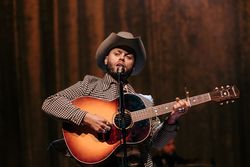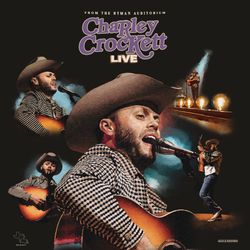Charley Crockett
Amoeba Berkeley - October 5th @ 4:00pm
Charley Crockett graces the Amoeba Berkeley stage with a live set and signing of his latest album, Live From the Ryman Auditorium (out 9/29 on Thirty Tigers), on Thursday, October 5th at 4pm!
Live From the Ryman Auditorium documents Crockett's sold-out 2022 performance at Nashville's historic Ryman Auditorium. Purchase the album at Amoeba Berkeley and get it signed after the set.
Catch Charley Crockett LIVE October 5th at The Fox Theatre in Oakland. Tickets here.
A note from Charley
Back when I was in my early 20s and just getting started with my music, I made my way to Nashville and took my first shot at busking on Broadway near the Ryman Auditorium. I knew from playing on the street in New Orleans that it’s a good idea to stay close to the touristy parts of town, just not in the heaviest traffic. So you don’t play on Broadway but a half block up or down on the side or on cross streets. Same thing in New Orleans. Bourbon is too wild and big, but Royal street, it’s still full of tourists, but it moves at a slower pace and folks are more likely to stop and listen. But Broadway was even louder and crazier than anything I’d seen on Bourbon Street, and I had a hard time getting much attention. Over the next decade, I kept going back, crashing at the Drake Motel and trying to get onstage at the open mics, mostly passing through town without anyone ever learning my name. After a while I was afraid to even stand near the Ryman—I’d look down that alley that leads to Robert’s Western World and think, “I’m not supposed to be here.” I wanted to play on that stage so badly, but I didn’t know how it would ever happen.
That’s what was running through my mind the night The Blue Drifters and I played the Ryman for the first time, a sold-out show on a Monday in November. About a third of the way into the set, just before my song “The Valley,” I said to the crowd “The alley’s just outside, but it’s a long way from right here.”
Selling out the Ryman for the first time is a once-in-a-lifetime event, and luckily my manager came up with the idea of filming the show. As a rule, I can’t stand watching videos of myself—I don’t really know how anyone can—but I’m grateful we captured that night. The crowd was truly something else, they stood up early on in the show and never sat back down again. It’s like something otherworldly was going on. Like all those ghosts from out in the alley were up there onstage with us.
It’s surreal seeing clips of the show now, mostly because the whole night feels like a haze in my mind. The last thing I remember before going on stage is standing in the hallway near the back door to the alley, looking at a photograph of George Jones and thinking about how he had stage fright just like I do. It’s something I’ve never been able to shake, and I swear if you were at the back of the Ryman and you squinted good enough when I walked onstage, you could see the butterflies flying out of my stomach. But once I got out there, something shifted in me for reasons I can’t fully explain. There are some nights when you get in your head and it’s so hard to stay in the moment, but that night I wasn’t the least bit self-conscious. Everything felt like a dream.
The only thing I remember clearly from our two-hour set is what happened after we played the title track from my album Music City USA. It’s a song that’s pretty critical of Nashville and the way the industry tends to ignore birds of a different feather; it talks about how I feel more at home with the ghosts in the alley than with the people under those bright lights on Broadway. When I played it, the crowd gave me a standing ovation and made so much noise that the band and I couldn’t start the next song. We had to cut that part for brevity when we put the album together, but they just kept going and going for maybe two minutes. I remember looking back at the guys thinking, “Man, is this really happening?” It completely shocked me, but it made me realize that all those people understood what I was singing about—they were all in that room for the same damn reason I was. It’s a feeling I won’t forget for as long as I live.
Just like with the rest of the tour, the main purpose of our setlist at the Ryman was to showcase The Man from Waco, a concept album I put out last September. We played some older songs too, like “Goin’ Back to Texas” from my 2018 record Lonesome as a Shadow. But even though I’ve got about a dozen albums in my catalog now, I wanted to make sure we paid respect to a lot of the artists who’ve influenced me over the years. Early on in the set, we played a George Jones song called “Between My House and Town,” which was partly my way of honoring one of the many people who helped make that stage really worth something. We covered three songs by the late great James Hand, a friend of mine who passed away in 2020 and who inspired so much of what I do, including nearly all of The Man from Waco. We did Jerry Reed's “I Feel For You” and T-Bone Walker’s “Travelin’ Blues” back-to-back, and during the encore I went out there alone with my acoustic guitar and played Townes Van Zandt’s “Tecumseh Valley”—a tribute to my sister, who left this world about seven years ago to that very night. Then we closed out with my song “Paint It Blue,” walked out the back door and through the alley to Robert’s, and drank until the lights came up. That was one of the best nights of my life.
Playing the Ryman was a full-circle moment for me in a lot of ways, including the stage setup itself. During that same time when I first started busking in Nashville, I spent some time crashing at a friend’s railroad apartment in Brooklyn in the middle of summer. There was no AC and it was hot as hell, so when I went to sleep at night I had to have a fan blowing right in my face. My friend had a TV with an old DVD player, and the only DVDs he had were a box set of The Best Of The Johnny Cash Show. I went through every episode and watched Johnny onstage at the Ryman, playing with George Jones and Bob Dylan and Ray Charles and all the rest. I loved that gold curtain in the background, and the red, blue, and green lights. So about 15 years later, when we were getting ready to tour The Man from Waco, I decided to base the entire look of the show around what I’d learned from Johnny Cash.
I loved the whole old-school variety-show aspect of what Johnny was doing. It’s the same reason I love Dolly Parton, who’s probably my number-one influence in terms of stage performance. She’ll get up there and sing pop songs, tell stories, play old-time music on the banjo, get on the guitar and play with a full band—and every single moment is mesmerizing. She comes from that same hillbilly vaudeville tradition as Hank Williams, the kind of thing where people were playing bygone pieces of roots music they learned on street corners. I’m from a hillbilly background too, coming from rural South Texas, and playing on the street really shaped who I am. But when I first started talking to record labels in Nashville, I kept hearing that my music was too all-over-the-place. The industry people couldn’t figure out how to categorize me, so they passed and moved on. It was tough to deal with, but I kept looking to people like Dolly and Johnny and tried to walk that same path. I’ve still got work to do, but every time I get onstage, I try to show all my different colors, everything from playing a banjo song to putting down my instrument and grabbing the mic and crooning like a lounge singer. That’s what I tried to bring to the crowd that night at the Ryman.
Another artist I kept thinking about was Waylon Jennings, whose 1976 LP Waylon Live was a big inspiration for my decision to cut a live album. The success of that record blows my mind, and I knew it would make sense to show how strong my band is after living on the highway 250 days a year for years on end. Waylon also famously said, “There’s always one more way to do things, and that’s your way,” which is something that means more and more to me as time goes by. You think about guys like Waylon and Willie Nelson, who couldn’t get a break at first—they weren’t making money and Nashville nearly crushed them, but they stood their ground and kept hanging in there until they finally broke through and found their audience. You’ve gotta really fight to break down the walls like that, but there’s nothing like stepping off that stage and knowing you did it your way.






